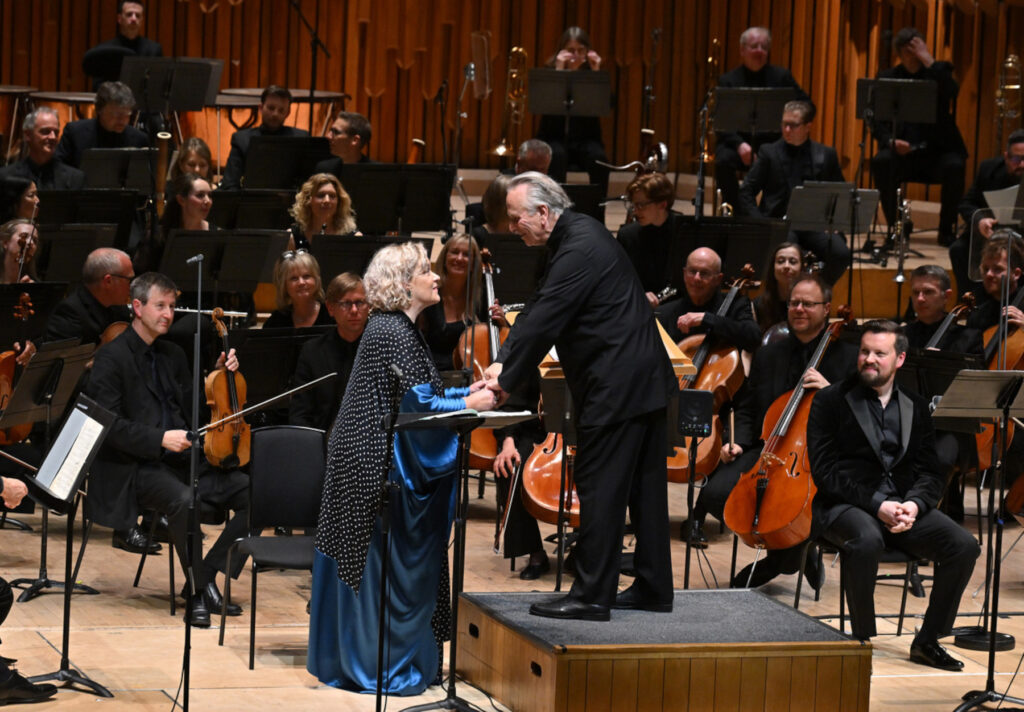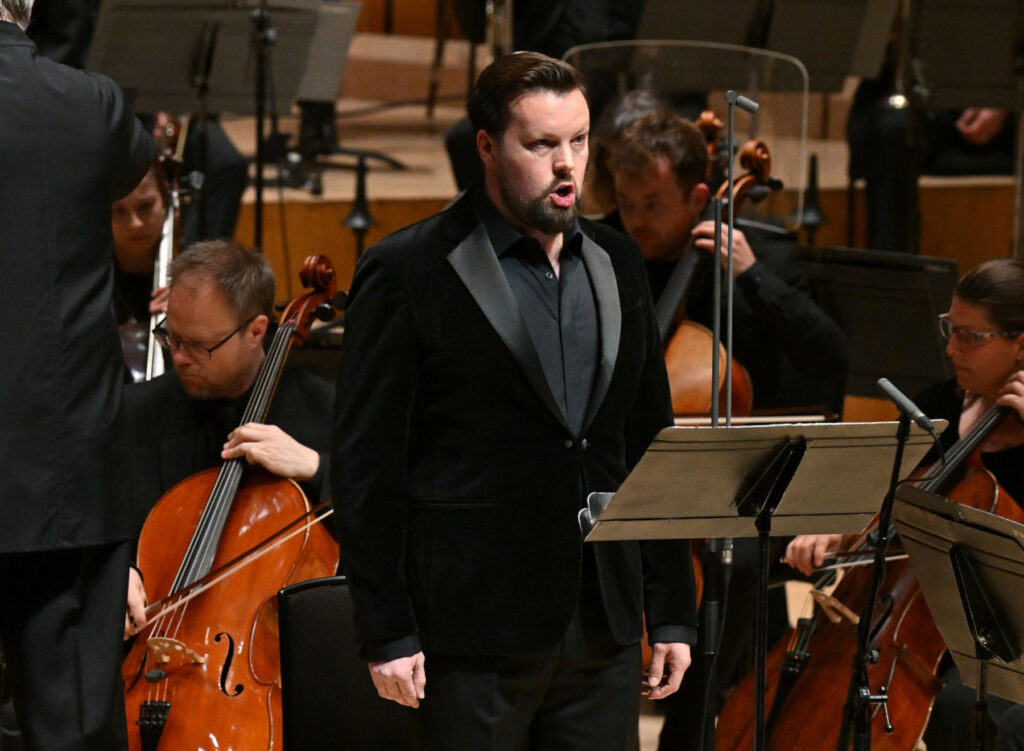Some composers, like Dvořák for instance, seemed at home in whichever genre they chose to write. Mahler, by contrast, though he repeatedly wrote for the human voice, never attempted an opera. As chief conductor at the Vienna State Opera, he would have known most nights when he was in the pit how to do it. Indeed, smart musicologists have identified many an Italian influence on his own symphonic writing. In a number of his works he came close to embracing the operatic mode: what is his Eighth Symphony, if not an opera manqué? Mahler’s Das Lied von der Erde, not given a numbering because of his superstition that his ninth shot at a symphony would turn out to be his last (it wasn’t), has two elements which have always struck me as prototypically operatic. First, in the opening Das Trinklied vom Jammer der Erde you really need a proper Heldentenor voice able to ride the orchestra and stamp an heroic authority on the music. Second, in the final movement which lasts almost as long as the other five put together, you have a kind of extended aria for a mezzo voice that communes prayer-like with itself.
For his texts Mahler drew on a collection of poems by Hans Bethge, indifferently translated from the original language, entitled “The Chinese Flute”. Its imagery with a heady mix of sensuousness, spectral references and vivid references to nature was bound to appeal to somebody like Mahler. That is why the words matter enormously. Each of the two soloists needs to be completely inside this world, alive to every shift in the colouring. David Butt Philip did not strike me as having the right approach here, though he wrestled manfully with the wide demands of the tessitura, albeit not hiding obvious moments of strain. A line such as “Dunkel ist das Leben, ist der Tod“ (Dark is life, dark is death) cries out for the application of chromophores. The repetition of “mehr wert” (worth more) requires greater intensity than we had in this performance. Admittedly, Mahler doesn’t make things easy for his tenor soloist: had he lived longer he would almost certainly have made adjustments in a score he never actually heard performed. How far does the conductor need to rein in the epic splendour of that first song, marked Allegro pesante (in a forceful and weighty manner) in order to accommodate a voice that struggles to sail above the dense orchestral textures? I’m not sure that Sir Mark Elder, in charge of the BBC Symphony Orchestra, always found a happy medium here; I also missed those moments of tenderness in this song that should tug at the heart.

The third song, Von der Jugend (Of Youth), suited Butt Philip better. Whenever the dynamic level fell to mf and the baritonal range opened up, the voice lost its earlier steel-edged sharpness and became more ingratiating. Yet even in the fifth song, Der Trunkene im Frühling (The Drunkard in Spring), some lines were delivered almost too casually. A line like “Ein Vogel singt im Baum” (A bird is singing in the tree) may appear quite perfunctory, but if delivered with a twinkle in the singer’s eye it opens up to one of those moments of sheer radiance when he subsequently announces “Der Lenz ist da” (Spring is here). Mahler knew well how to express unbridled joy.
It is always unfortunate when the two soloists are not evenly matched. If Butt Philip failed to satisfy in critical instances, Alice Coote demonstrated yet again why she is one of this country’s finest, if not the finest, of Mahler’s interpreters for the mezzo voice. Where the second song, Der Einsame im Herbst (The Lonely Man in Autumn), deals in all those pictographic references – autumn mists drifting blue over the lake, jade-dust over the delicate blossoms, lotus-flowers floating on the water – it helps enormously when a soloist of Coote’s stature knows exactly how to release emotional energy from individual words, aided wonderfully here by Alison Teale’s plaintive oboe. When Coote sang “Mein Herz ist müde” (My heart is weary), this came directly from the heart, and the voice opened out majestically for “Ich komm’ zu dir” (I come to you) and “Sonne der Liebe” (Sun of love). In addition, she had all the right vocal smiles in the fourth song, Von der Schönheit (Of Beauty), with its many references to the felicities of life.

And so to the concluding, most moving, of the six movements: Der Abschied (The Farewell). This inhabits territory that Mahler was a masterly curator of: the growing awareness of the transitory nature of life itself, nostalgic backward glances, a creeping sense of desolation and ultimately an acceptance of individual fate. Elder gauged the start splendidly, the strokes of the tam-tam and low horns signalling the life-force ebbing away, and I loved his attention to details such as the shuddering of the double-basses, the icy chill in the flute solo, the dolorous bassoon, as well as his expert pacing of the central orchestral funeral march. One of the many ways in which you sensed her complete identification with the music came in Coote’s body language: subtle shifts in the upper limbs, a tilt of the head, a mouth open in wonderment, glances ferried in different directions, eyelids sometimes closed. Particularly noteworthy was her terracing of dynamics, scaling back for a sotto voce rendition of “Die Welt schläft ein” (The world is falling asleep), with each “Ewig” (Forever) at the close coloured differently until its final iteration just above the levels of audibility.
What does this magnificent work teach us? That life is full of energy and all the temptations of hedonism, as well as its sadder moments too, but that it is nature and the life within which commands our attention in all its self-renewing properties. Even when individual lives are extinguished, life-force itself continues. Acceptance of this brings serenity, the quality that radiates Zen-like throughout the dying moments of this song-symphony.
Franz Schreker, one of many casualties of the cultural barbarism for which Nazi Germany was responsible, is certainly worth exploring further. Composer of 9 operas, he once described himself in these terms: “I am a sound-artist, sound-fantasist, sound-wizard, sound-aesthete”. During the early years of the Weimar Republic Schreker was the most performed living composer after Richard Strauss. It was therefore admirable that Elder chose his Kammersymphonie to fill the first half, not least because in the musical chinoiserie at the start with the scent of a perfumed garden in the air there was already an anticipation of the sonorities Mahler had explored almost a decade earlier, which turned him increasingly in his annus horribilis of 1907 towards his own palpable mortality.
It is a chamber symphony, to be sure, though despite Schreker stipulating a minimum of 24 players in his preface to the score he also recommended augmenting the strings for performances in larger halls. Elder had 26 strings on the platform, together with four woodwind and three brass soloists, timpani, harp, piano, celesta, harmonium and an array of percussion instruments. It felt and sounded big, especially when climaxes were capped by cymbal crashes. Elder took a leisurely view of the work, savouring the lush Romanticism with its nods to Richard Strauss, the filigree delicacy of pastoral episodes which would not be out of place in Debussy or Delius, and the subtle inflections of tempo that introduced march and gigue-like elements. My ear was constantly teased by instrumental details like the rippling celesta, a growling trombone and questioning clarinet, hints of anguish from the strings and, towards the close, dark and mysterious underpinning from the horn. It was all a reminder that composers who followed on from Mahler built on the land he had once occupied.
Alexander Hall
Franz Schreker – Kammersymphonie (Chamber Symphony); Gustav Mahler – Das Lied von der Erde
Alice Coote (mezzo-soprano); David Butt Philip (tenor); BBC Symphony Orchestra – Sir Mark Elder
Barbican Centre, London, 23 May 2025
Top image: Sir Mark Elder, Alice Coote and David Butt Philip
All photos © Mark Allan